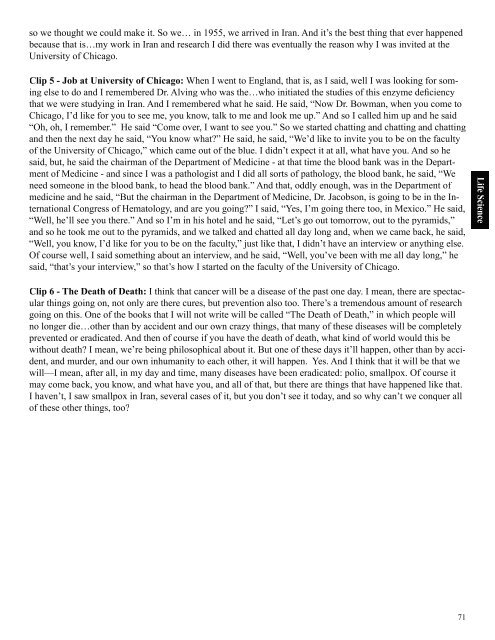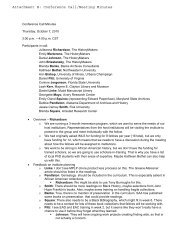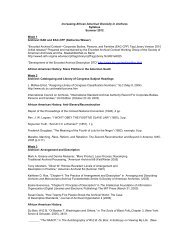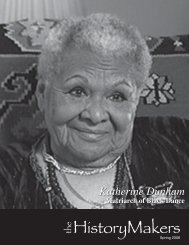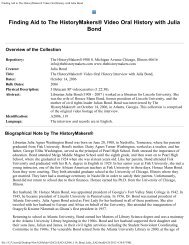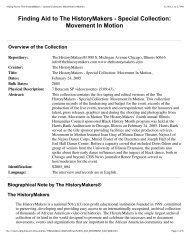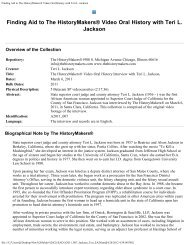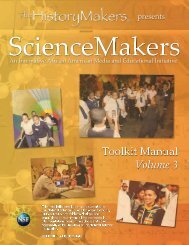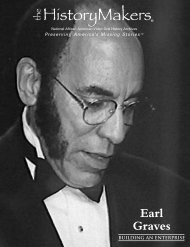ScienceMakers Toolkit Manual - The History Makers
ScienceMakers Toolkit Manual - The History Makers
ScienceMakers Toolkit Manual - The History Makers
You also want an ePaper? Increase the reach of your titles
YUMPU automatically turns print PDFs into web optimized ePapers that Google loves.
so we thought we could make it. So we… in 1955, we arrived in Iran. And it’s the best thing that ever happened<br />
because that is…my work in Iran and research I did there was eventually the reason why I was invited at the<br />
University of Chicago.<br />
Clip 5 - Job at University of Chicago: When I went to England, that is, as I said, well I was looking for soming<br />
else to do and I remembered Dr. Alving who was the…who initiated the studies of this enzyme defi ciency<br />
that we were studying in Iran. And I remembered what he said. He said, “Now Dr. Bowman, when you come to<br />
Chicago, I’d like for you to see me, you know, talk to me and look me up.” And so I called him up and he said<br />
“Oh, oh, I remember.” He said “Come over, I want to see you.” So we started chatting and chatting and chatting<br />
and then the next day he said, “You know what?” He said, he said, “We’d like to invite you to be on the faculty<br />
of the University of Chicago,” which came out of the blue. I didn’t expect it at all, what have you. And so he<br />
said, but, he said the chairman of the Department of Medicine - at that time the blood bank was in the Department<br />
of Medicine - and since I was a pathologist and I did all sorts of pathology, the blood bank, he said, “We<br />
need someone in the blood bank, to head the blood bank.” And that, oddly enough, was in the Department of<br />
medicine and he said, “But the chairman in the Department of Medicine, Dr. Jacobson, is going to be in the International<br />
Congress of Hematology, and are you going?” I said, “Yes, I’m going there too, in Mexico.” He said,<br />
“Well, he’ll see you there.” And so I’m in his hotel and he said, “Let’s go out tomorrow, out to the pyramids,”<br />
and so he took me out to the pyramids, and we talked and chatted all day long and, when we came back, he said,<br />
“Well, you know, I’d like for you to be on the faculty,” just like that, I didn’t have an interview or anything else.<br />
Of course well, I said something about an interview, and he said, “Well, you’ve been with me all day long,” he<br />
said, “that’s your interview,” so that’s how I started on the faculty of the University of Chicago.<br />
Clip 6 - <strong>The</strong> Death of Death: I think that cancer will be a disease of the past one day. I mean, there are spectacular<br />
things going on, not only are there cures, but prevention also too. <strong>The</strong>re’s a tremendous amount of research<br />
going on this. One of the books that I will not write will be called “<strong>The</strong> Death of Death,” in which people will<br />
no longer die…other than by accident and our own crazy things, that many of these diseases will be completely<br />
prevented or eradicated. And then of course if you have the death of death, what kind of world would this be<br />
without death? I mean, we’re being philosophical about it. But one of these days it’ll happen, other than by accident,<br />
and murder, and our own inhumanity to each other, it will happen. Yes. And I think that it will be that we<br />
will—I mean, after all, in my day and time, many diseases have been eradicated: polio, smallpox. Of course it<br />
may come back, you know, and what have you, and all of that, but there are things that have happened like that.<br />
I haven’t, I saw smallpox in Iran, several cases of it, but you don’t see it today, and so why can’t we conquer all<br />
of these other things, too?<br />
71<br />
Life Science


